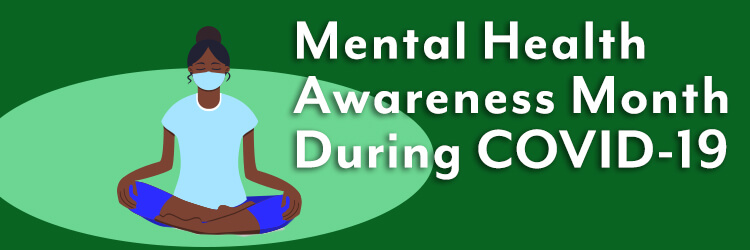[vc_row][vc_column][vc_column_text]Today begins May, Mental Health Awareness Month. With mental health suffering on a global scale because of COVID-19, now is a really important time to honor that campaign.
May was declared Mental Health Month in 1949 by what was then known as The National Association for Mental Health (now Mental Health America). Each year the organization picks a theme about a specific aspect of mental health. The goal is to educate the public about—and ultimately increase resources for—people with mental health disorders.
Declaring May Mental Health Month was also an important step towards ending the stigma surrounding mental health disorders. If people are living in a culture of stigma, they may avoid seeking help. And internalizing shame becomes devastating over time, continuing a cycle of poor mental health. Mental Health Awareness Month is an acknowledgement that people who are suffering need quality and informed support, not shaming.
That’s a great message to keep in mind right now. While so many people are experiencing mental health struggles, there are online campaigns about how to be productive and “live your best quarantine life.” This may lead to feelings of shame if a person feels like they are doing their best just to survive. And while we always need as many mental health resources as we can get, during a crisis people need increased support.
With any major crisis, mental health and substance use struggles increase. According to the World Health Organization, 1 in 5 people living in an area affected by conflict will experience Depression, Anxiety, PTSD, Bipolar Disorder, or Schizophrenia. 1 in 10 adults living in New York City showed signs of Depression in the month after the 9/11 attacks. One study found a 29% increase in drug use among Hurricane Katrina survivors.
The COVID-19 pandemic compounds a lot of factors that on their own negatively affect mental health. Long-term isolation, uncertainty, stress, loss of income, loss of routine, death, illness, grief—each of these taken by itself can be personally devastating. Add to this the fact that it’s all happening on a mass scale. Everyone is affected differently, but nearly everyone is affected. It’s inevitable that overall mental health distress and substance use will increase.
This month is a good time to remember to go easy on yourself, prioritize your mental health, and give support where you can. The theme of this year’s Mental Health Awareness Month, “Tools 2 Thrive,” is a response to the COVID-19 crisis. It’s a toolkit with handouts like “Creating Healthy Routines,” “Supporting Others,” and “Connecting with Others.” All of these are important ways to take care of your mental health during this very rough period.
During this crisis, when we’re hearing so much necessary information about how to take care of our physical health, remember that your mental health is just as important. Mental Health Awareness Month is a good reminder of that.
If you are struggling with your mental health, or a Substance Use Disorder, there is help and hope. TruHealing Centers across the country are open and here for you during this crisis, with hospital-grade sanitization of our facilities so you can feel safe in treatment. Our staff—many of whom have been where you are—will give you the tools to thrive in long-term recovery. Call an admissions specialist at 410-593-0005.[/vc_column_text][/vc_column][/vc_row]









